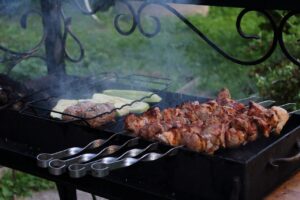When it comes to grilling, getting the perfect sear on your favorite foods is a top priority. However, it’s essential to understand the capabilities and limitations of your gas grill.
In this article, we explore the question, “Can a gas grill get too hot?” and delve into various factors that may contribute to excessive heat. So, let’s fire up the discussion!
Understanding Heat Output:
Gas grills are designed to generate high temperatures to cook food quickly and efficiently. The heat of a gas grill is measured in BTUs (British Thermal Units). The greater the BTU rating, the higher the heat output. While adequate heat is essential for grilling, excessive heat can pose several challenges.
Factors That Can Lead to Excessive Heat:
- BTU Rating: Gas grills with high BTU ratings have the potential to get extremely hot. However, a higher BTU rating doesn’t necessarily mean better performance. It’s crucial to find a balance between BTU output and grill size for optimal heat control.
- Grill Size and Design: The size and design of your gas grill can influence its heat distribution and retention. Compact grills usually have limited space for heat to disperse, resulting in higher temperatures. On the other hand, larger grills with multiple burners provide better heat control.
- Weather Conditions: Environmental factors, such as ambient temperature and wind, can affect the performance of a gas grill. Hot weather or windy conditions may cause the grill to reach higher temperatures than desired. Adjusting the grill settings accordingly can help combat this issue.
Preventing Excessive Heat:
- Temperature Control: Gas grills typically have adjustable knobs or dials to regulate the heat. Experiment with different settings to find the ideal temperature range for your cooking needs. It’s recommended to preheat the grill and then adjust the knobs to maintain the desired temperature.
- Using a Grill Thermometer: Invest in a reliable grill thermometer to accurately monitor the temperature inside the grill. This allows you to ensure consistent heat and prevent overheating.
- Managing Flare-ups: Excessive flare-ups can cause sudden bursts of high heat. Keep flare-ups in check by trimming excess fat from meat, using a drip tray to catch drippings, and avoiding excessive grease buildup on the grill grates.
Conclusion:
In conclusion, while gas grills are designed to generate high temperatures, they can indeed get too hot if not properly managed.
Factors such as BTU rating, grill size, environmental conditions, and user control all play a role in maintaining the right temperature.
By understanding these factors and following proper grilling practices, you can achieve the perfect balance of heat for your culinary masterpiece.
Remember, safety is paramount. Always follow the manufacturer’s guidelines and exercise caution while operating a gas grill.
Helpful Tips to Keep Your Gas Grill Heat in Check:
- Clean your grill regularly to prevent grease build-up that could lead to excessive heat.
- Keep a fire extinguisher nearby when grilling to address any unexpected flare-ups.
- Opt for indirect grilling methods, such as using a drip pan and turning off some burners, to control heat further.
Factors Affecting Gas Grill Heat:
| Factor | Description |
|---|---|
| BTU Rating | Higher BTU ratings generate more heat, but it’s essential to find the right balance. |
| Grill Size and Design | Compact grills may reach higher temperatures due to limited space for heat dispersion. |
| Weather Conditions | Hot weather or wind can cause a gas grill to reach higher temperatures than desired. |
| Temperature Control | Experiment with grill settings to find the right temperature range for your cooking needs. |
| Using a Grill Thermometer | A reliable thermometer ensures accurate temperature monitoring and heat management. |
| Managing Flare-ups | Controlling fat and grease to prevent sudden bursts of high heat and flare-ups. |
